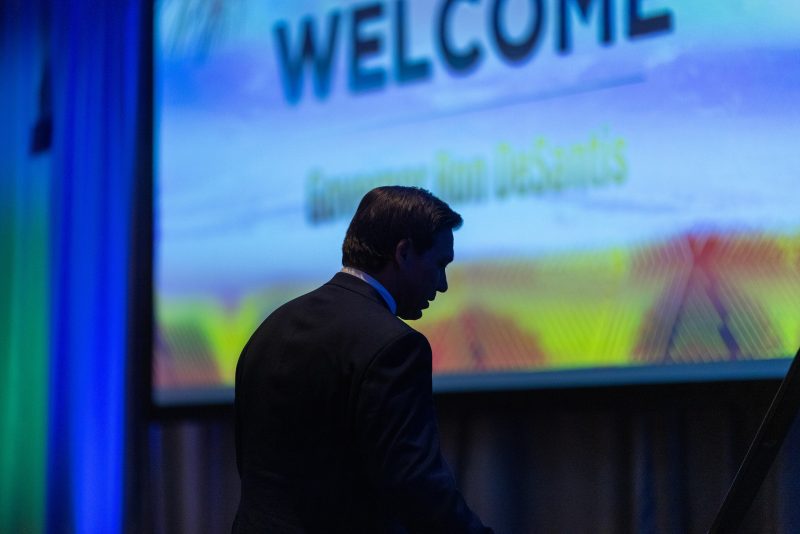There are three situations in which a poker player might go all in. One is that she has such a good hand that she’s confident no one else can take the pot. A second is when the player wants the others at the table to think she has that good a hand, so she bluffs. And then there’s the third: when she runs out of chips to play.
Maybe Florida Gov. Ron DeSantis’s big push for the Iowa caucuses, reported on Wednesday, is a bluff. Maybe it’s an effort to suggest more strength than is apparent externally. It pretty clearly isn’t because DeSantis has a particularly good hand there — or anywhere else, really. Polling in the state consistently shows him down at least 20 points and not gaining ground.
Or maybe it’s just the only chips he has left.
There have been recent opportunities for DeSantis to reshape the GOP nominating contest. Over the course of the past six weeks, the Republican Party has hosted two prime-time debates, with millions of people tuning in. The day before the first debate, DeSantis had the support of about 15 percent of the likely primary voter pool in FiveThirtyEight’s average of polls. A week after the debate, he sat at … 15 percent.
But then came the second debate, about a month after the first one. On the day of the debate, DeSantis was at 14 percent. A week later, he is still at 14 percent. If math isn’t your thing, allow me to crunch the numbers: DeSantis has lost one percentage point since the day before the first debate.
That didn’t blunt the enthusiasm his team offered for Wednesday’s news. The campaign announced that it had raised $15 million in the third quarter, a “significant fundraising haul” that “shuts down the doubters who counted out Ron DeSantis for far too long,” campaign manager James Uthmeier said in a statement. But only $5 million of that can be used for the primary, which is a significant limitation. Perhaps the doubters still have some cause to raise doubts?
The outside PAC that’s aiding DeSantis — more than such PACs normally do, in fact — collected as much as $20 million in additional fundraising, according to reporting from the Dispatch. Maybe it’s lowballing those estimates to overperform once the numbers are reported publicly, but the Dispatch also had DeSantis’s team coming in right at $15 million.
Perhaps you remember, though, that PAC’s exhortations right before the first debate. It needed $50 million before the end of September, potential donors were told, according to the New York Times, with DeSantis needing to beat Trump in “the next 60 days” while distancing himself from rivals immediately. If I might again serve as your personal calculator: $20 million is substantially less than $50 million.
I will also note that DeSantis has not obviously “beaten” Trump, though it’s not really clear what that meant. (This hasn’t stopped the Trump campaign from giddily emailing reporters with its “Kiss of Death Countdown,” running out the clock until 60 days pass.) It is clear, though, that DeSantis has very much not separated from the rest of the field. In mid-August, he was leading business executive Vivek Ramaswamy by seven points. Now, he leads former ambassador to the United Nations Nikki Haley by six points.
Haley was the only candidate to gain much ground after the first debate, though not enough to move into second place. She has ticked up more since the second one, too. A poll conducted by Suffolk University for the Boston Globe and USA Today put her in second place in New Hampshire for the first time, usurping the position held in most polls by a certain Florida governor. She’s not threatening Trump to any significant degree, but she’s also not getting kiss-of-death countdowns. Trump, meanwhile, is calling for his party to just skip the debates and admit he’s going to be the nominee.
So DeSantis is pushing his chips to Iowa. Several of his staffers in Tallahassee will be relocated to the state as the governor aims for an early upset that — maybe? finally? — could shake up the race. Maybe, DeSantis hopes, he can repeat the successes notched by past Iowa caucus winners, including Ted Cruz in 2016, Rick Santorum in 2012 and Mike Huckabee in 2008. At the very least, the Times wrote, he hopes to perhaps show that Trump is beatable, useful given that DeSantis’s long-standing “Trump is an electoral loser” pitch has been hard to defend when the former president is up by 30 points in the polls.
There is, of course, another thing that losing poker players can do, rather than go all in. They can fold and cash out what they have left.

